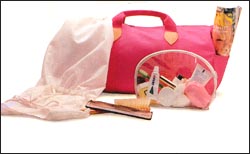
- 한두 개의 화장복
- 나이트 가운 2벌 (젖을 먹이려면 앞자락이 터진 가운이 더 좋다.)
- 슬리퍼
- 브래지어 2개 (모유수유를 하려면 수유용 브래지어를 가지고 간다)
- 한두 개의 팬티
- 적어도 12개 정도의 위생용 패드
- 치약과 칫솔, 입 횡구는 액체
- 머리빗, 브러시, 거울, 머리 고대용 기구
- 화장품, 샴푸, 화장지, 비누, 세숫수건
- 한두 권의 책이나 잡지
- 퇴원할 때 입을 옷 한두 벌
- 공중전화, 파킹, 스낵을 할 때 필요로 하는 잔돈과 용돈
- 친구들, 친척들, 의료 보험회사, 아기 소아과 의사의 전화번호
- 셀루라 폰
- 카메라나 비디오
- 스낵
- 시계
- 손톱 깍기
- 양말 몇 켤레
- 베개
- 의료보험증, 입원수속을 하는데 필요한 서류
- 아기용 기저귀와 베이비 와이퍼
- 아기용 승용차 안전의자
- 선물을 넣을 빈 가방
- 아기 옷
- 그 외
Copyright ⓒ 2014 John Sangwon Lee, MD., FAAP
What mothers need when delivering in hospital and recovering after childbirth
진통, 출산, 산후회복을 하는 동안 임산부에 필요한 것들

There are many things that the mother and baby need until they come home from the hospital after delivery and postpartum recovery.
![]()
In the hospital, the mother’s needs are packed before labor begins, and they are put in a bag, and when labor begins, they must pick up the bag and go directly to the hospital where they will deliver. What a pregnant woman needs at the hospital will vary depending on each pregnant woman and the hospital in which she will be hospitalized, but when they go to the hospital for delivery, they usually take the following:
- One or two makeup clothes
- 2 nightgowns (If you are breastfeeding,
- a gown with an open hem is better.
- slipper 2 bras (bring a breastfeeding bra if you are breastfeeding)
- One or two panties
- At least 12 sanitary pads
- Toothpaste,
- toothbrush,
- mouthwash
- liquid Hairbrushes,
- brushes,
- mirrors,and hair tools
- Cosmetics,
- shampoo,
- toilet paper,
- soap,
- face towel
- One or two books or magazines
- One or two sets of clothes to wear when you leave the hospital
- Change and pocket money needed for payphones, parking, and snacks
- Phone numbers of friends, relatives,
- health insurance companies, and baby pediatricians
- Cellular Phone
- Camera or video snack clock
- Nail clippers
- A few pairs of socks
- Pillow
- Medical insurance card, documents required for hospitalization procedures
- Baby diapers and baby wipes
- Baby Car Safety, Chair
- Empty bag for a gift Baby
- clothes
- etc
Back in the meantime, bring a bag with what you have prepared and go to the hospital where you will deliver.
Most hospitals these days provide toothbrushes, toothpaste, towels, toilet paper, hygiene pads, diapers, and artificial nutrition for babies and mothers while they are in the hospital. However, you must bring your baby’s clothes with you when you go home after delivery, and other things your mother and baby need.
Depending on the season of delivery, the diary, the sex of the baby, and the hospital, the baby needs to be prepared differently.
In general, baby blankets, bags, sweaters, socks, hats, diapers, diaper safety pins, and shirts are required. Copyright ⓒ 2014 John Sangwon Lee, MD., FAAP
“부모도 반의사가 되어야 한다”-본 사이트의 내용은 여러분들의 의사로부터 얻은 정보와 진료를 대신할 수 없습니다.
“The information contained in this publication should not be used as a substitute for the medical care and advice of your doctor. There may be variations in treatment that your doctor may recommend based on individual facts and circumstances.
“Parental education is the best medicine.“